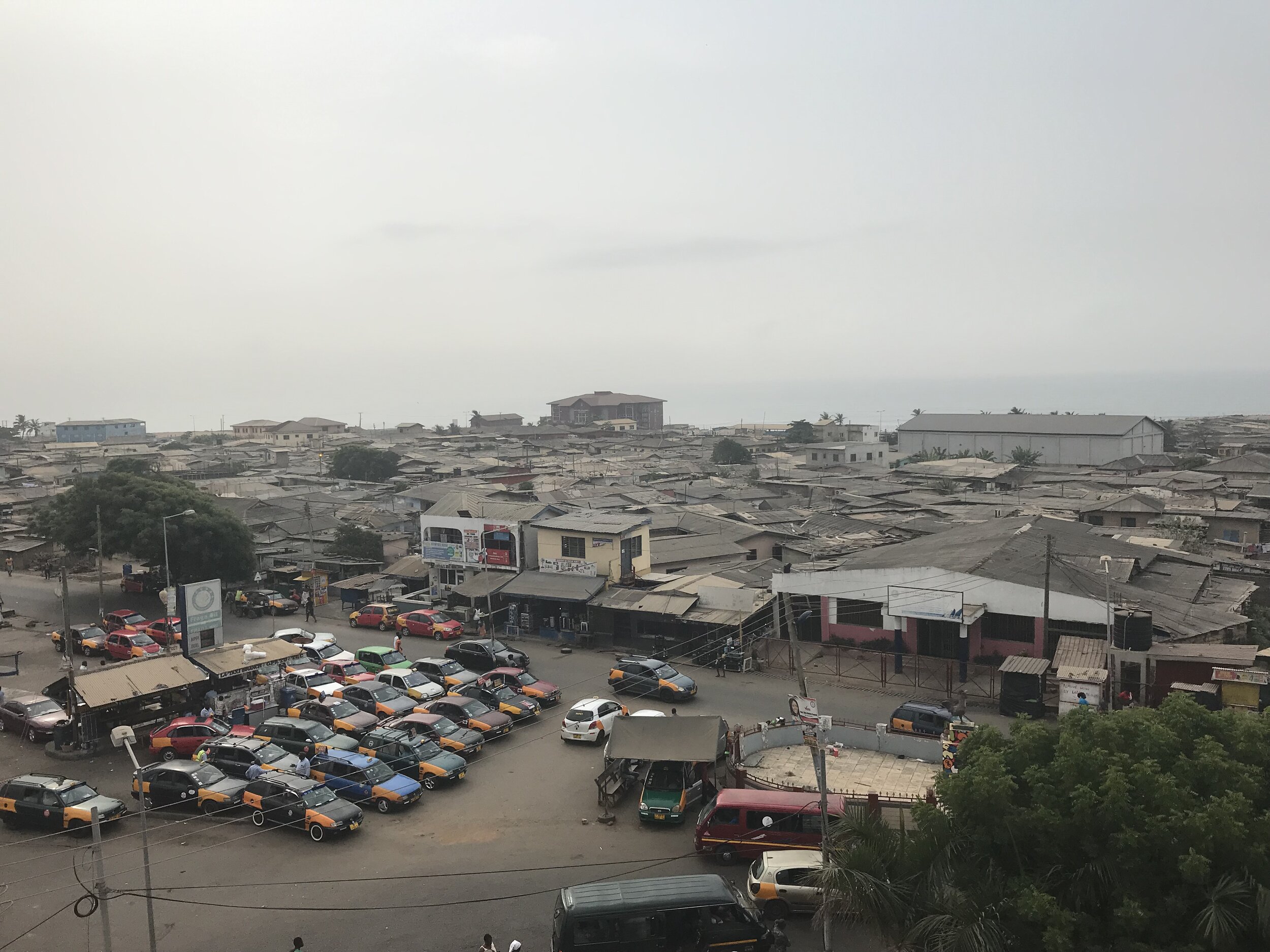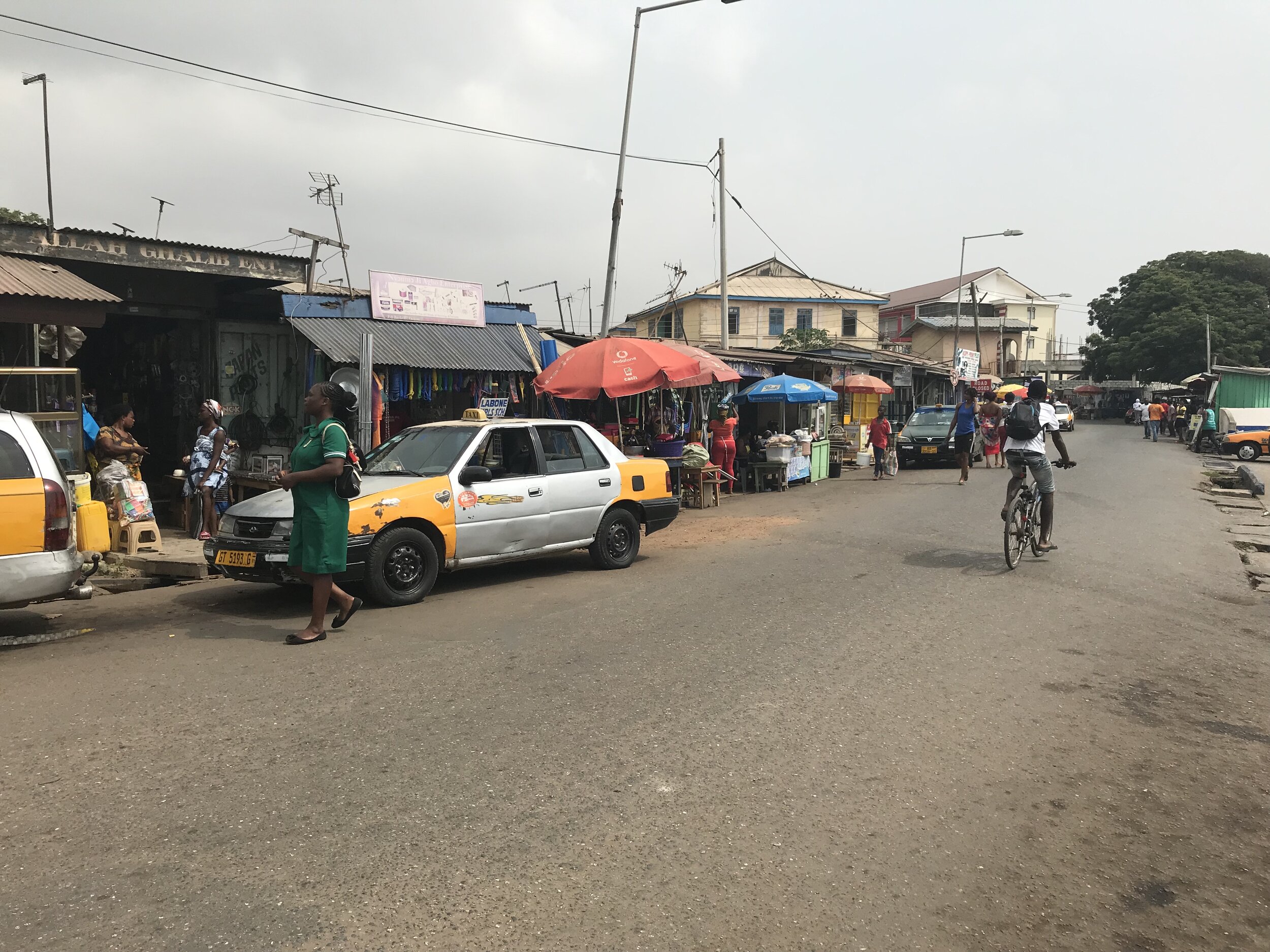PICTURED: The streets above Labad, a neighborhood which literally means “the bad” and was given to it by colonial powers for the bad people that lived there. Throwing off the colonial yoke, the locals call themselves and the neighborhood, simple “La”.
Ghana was the 15th country I’ve visited and it had by far the worst system of roads I’ve experienced. It also had as near as makes no difference the worst standard of driving, though my memories of certain cab rides in China have something to say about that; the frustration of traffic is so localized and rarely imprints very far into your memory banks no matter how intolerable it is at a given moment. For instance there was one or two trips up and down 66 near my home in Washington D.C. last autumn that brought me to the brink of concluding that human nature is inherently evil. Barbara and Kwadwo, my poor Ghanaian hosts had to attach on so many extra hours onto their daily commute to make up for traffic, and their poor unfortunate Toyota which Kwadwo cared for admirably still visibly suffered every day he employed its services. If I was to go into town with them, I would wake at 4:30, and had to be fully equipped to spend 15 hours before seeing the house again, returning as we often would around 7:50. As I was there at the onset of the dry season, the lack of moisture in the air meant that the dust which lined the pockmarked avenues was very fine. When tossed into the air by tires, its settling cloaked everything in a layer of brown. Eternally stuck in second and third gear, the cars plowed along, hindered endlessly by tyrannical terror-causing combi-vans which weaved in and out of traffic constantly, first to position themselves along the roadside to try and snag a passenger, and then always swerving back into the farthest-left lane so they could drive as fast as was possible. It’s safe to say that if you are going to Accra and want to get anywhere, plan accordingly and bring a Chinese-style commuter mask.
Among all these wasted hours, Kwadwo and I talked about nearly everything either of us could think about. No matter where you go in the world, there are about three things which every cab driver or bartender will talk to you about: government inefficiencies, weather, and traffic. Combining two of these three topics, one of the earliest conversations centered around the state of the roads in relation to the particular period of the Ghanaian national election cycle we were in. “We are entering an election year, which means the roads will be fixed soon,” he said to me. Entering is the most important word there, for since representatives and presidential hopefuls had enjoyed 3 long years of uncontested power, the needs of the people naturally found their way into the garbage bin. Kwadwo explained to me that one morning, you’ll wake up, and every road will be under reconstruction, with each one bearing the picture of the toothy grin and colorful shirt of a politician doing the work of his constituency. And then elections happen and the roads go back to being awful. This is because, as Kwadwo told me, they only have time or money to repair them by pressing blacktop back onto the surface, without ever addressing the foundations and necessary layers of earth needed for a road to stay functional for years.
One morning Kwadwo took me to visit his older sister, Aretha, an absolutely charming mother of 5 and perfect ambassador of the finer points of her nation and culture. On our way, we passed some members of her community who were taking the curse of the traffic and poor roads into their own hands, and had managed to acquire earth, wheelbarrows, spades, and even a dump truck, in a capitalistic attempt to repair the road that ran through their neighborhood – one of the worst I’d yet seen. Admittedly I had no idea what degree of success they had, but by the time we left Aretha’s they were much farther along in attempting to lay a thick and even layer of dirt over the ravaged shreds of pavement that looked like Sonny Corleone’s shirt after he made his unfortunate stop at the roadblock in The Godfather (and yes I know that’s the second Godfather reference I’ve made in my dispatches on Ghana). That evening, Kwadwo and I sat on his balcony discussing the nature of the state and whether it has any legitimacy, any rights, or any authority to use force against us. We had a very interesting conversation regarding economics and the state of Ghana’s economy in relation to other West African countries, specifically the Francophone ones.
PICTURED: Aretha and I on one of our busy afternoons shopping and hanging out.
As a libertarian and limited-government fellow I could discuss this adnosiem, but there was something special about going over the same ideas I’ve applied to the United States government a hundred times but with Africa in the focusing lense. Not only was everyone I met very interested and open to these ideas, in ways that Americans rarely are I find, but very eager to add their own accounts and theories. The old adage about how power corrupts and that absolute power corrupts absolutely could be tweaked a little on this topic to “governments are corrupt and African governments are corrupt absolutely”. I make no judgements, as I have little faith in my own government, and none of this is anything which wasn’t explained to me eagerly by the people in Namibia and Ghana alike, even though the two countries represented completely distinct Africas. When I suggested to Kwadwo (and others in my visit) that taxation is simply a system of what Frederic Bastiat described as “legal plunder,” and that the government has no method of creating its own wealth and must therefore “plunder” it from the citizenry after granting itself the “legal” rights to do so on the order of the gun, many Africans, such as a young accountant and Liverpool FC supporter I met in Windhoek suggested that the government needed tax money to do things and therefore we must pay taxes. But of all groups of people on earth, Africans have a sniff or two about what is right and wrong in terms of forceable actions and constenting actions, and so when I suggested that you (Kwadwo – banker, auditor, and accountant) or you (random cab driver) or you (Aretha – pharmacy owner) also need money to do things, but that you aren’t allowed to take money from people with threats of violence, they all unanimously agreed with me.
I’d love to keep talking about travel – which I will return to later, but I’m trying to hold the chronological order of my trip. So continuing in the vein of economics, the rich irony here is that none of the Ghanaians ever offered me the usual fare I receive when I suggest to people that the government has no right to tax us, that is to say, suggest to me who will build the roads if they don’t. The obvious reason that the Ghanaians don’t respond like Americans is because the state of the roads in Ghana is abysmal! This is a clear case of us being so laser-focused on counting basketballs that we don’t notice the man in the gorilla suit, as per the famous YouTube experiment. The gorilla-suit-illegality of a state’s claim to legal plunder may be hidden behind the basketball-counting of what they spend our money on, but that doesn’t mean it’s any less wrong. The basketball-counting may lead us to conclude that driving on these nice American roads as opposed to these terrible Ghanaian roads means taxation is an effective means of governance, but the gorilla suit-military-intelligence-industrial-establishment, its endless murdering of innocents, surveillance of our lives, and its bankrupting of our nation, should lead us to conclude the opposite. That’s very easy to see here in Ghana, where there are no good roads, and where still the tax man comes, mother-of-pearl gilded lockbox in hand flanked by armed military-police, to knock on your door with his snake eyes and silver tongue asking you to do your civic duty.





